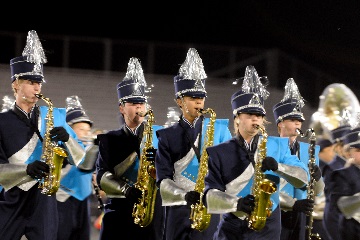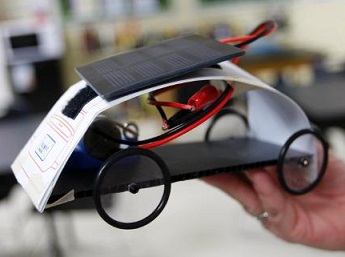
I had an embarrassing moment a little over a month ago.
I’ve been fortunate over the past two years to teach next door to a lady who (a) is generally as cynical as I am about most things, (b) has been in public education for long enough to have seen and heard it all, and (c) is supernaturally gracious when it comes to my shortcomings as an English teacher.
Several years ago, I reached a point at which I needed to either get out of public education altogether or find myself a dramatic new change of scenery, focus, and attitude. I ended up doing the latter. I became certified in English Language Arts (ELA) and I jumped to a district completely unlike anywhere I’d ever taught before.
Time to put your daily grind where your big talk is, Blue.
Of course, certification is one thing; being able to actually teach ELA effectively is something else entirely. I could read and write well enough, and I considered myself respectable enough when it came to analyzing literature or composing a coherent argument. But a real English teacher? Hardly.
I worried I’d show up to my first department meeting and we’d all be taking turns reading from The Dubliners in the original Greek and discussing how James Joyce Carol Oates used it as inspiration for his adaptation of Undercover Brother, Where Art Thou?
I needn’t have been concerned. We haven’t had a department meeting in the entire two years I’ve been there, so the danger seems fairly minor at this point.
I made it through a little over a semester before the pandemic hit and everything got weird(er). We were entirely virtual in the fall of last year, but by second semester we had at least some in-person learning. While there were few positives in the entire mess, I at least had plenty of time to brush up on the ELA curriculum and reacquaint myself with things like gerunds, antecedents, and passive tense. There were times I almost felt minimally competent!
Until this past May, dammit – which brings me back to that embarrassing moment I mentioned.
There were only a few weeks left until semester exams, which matter more in my district than they probably should. I was flipping through the official curriculum when I came across something I suspected I should have covered at some point, pandemic or no pandemic. Somehow, I’d overlooked it.
I walked next door to my trusted mentor-slash-colleague and shared my thoughts relatively unfiltered, as was our wont. “I wonder if we should have done ‘elements of a story’ – plot, setting, types of conflict, and all that. Seems like maybe that should have come up before now.”
She started laughing, which confused me for a moment until I realized she assumed I was kidding. It was as if I’d walked in and suggested maybe I should have worn pants today since I had a meeting with my evaluating administrator. Not particularly sophisticated humor, but enough to share a chuckle in the workplace.
I suppose the look on my face tipped her off that she’d misread the situation and her smile quickly faded. “Wait, you’re serious?”
If this were a sit-com, I’d have quickly covered my snafu by heartily joining in with uncomfortable laughter at my own expense. Instead, I had a rare moment of embarrassed silence.
She quickly shifted gears and assured me that this past year had been so weird anyway that the best any of us could do was to reboot and start fresh in the fall. She shared a few approaches she’d used to teaching elements of a story – you know, way back earlier in the year – and was generally encouraging and supportive while never quite losing that look of bewildered pity for the well-intentioned fool next door. Then again, I was the best they could hold onto in this particular place, so… that’s what you get.
The whole experience got me thinking about other stuff in the official curriculum which I’d never actually gotten around to in class. So far, these omissions have largely been externally-driven – casualties of modified schedules and ever-changing circumstances. In a few months, I’ll have live students, many of whom haven’t been in school in any way, shape, or form for nearly eighteen months.
I’ll need to make semi-informed decisions about what matters and what doesn’t with these darlings. Of course, we’re supposed to cover all of it, passionately and thoroughly. But… between you and me? That’s delusional in the best of circumstances and it’s just not going to happen. I was hired to teach a specific curriculum, but part of that obligation is using my professional judgement to determine what’s most effective with the kids in front of me.
Plowing through all of it one way or the other isn’t what’s most effective in this case. So what do I, in my pompous wisdom, prioritize? And what legit ELA undertakings do I discard as less worthy of our limited time? Like any subject, it’s all interesting and potentially important if given unlimited time by the system and unwavering commitment from each and every student. Lacking that, however, I have no ethical problem cutting some “required” matter loose in order to improve the odds the rest meaningfully sticks – at least a little.
Hence my “Keeping & Culling” list, initial rough draft.
We’re going to keep setting aside time to read in class several times each week whether it’s officially part of the “curriculum” or not. I’m too sold on the power of that time modeled and practiced regularly in class, by myself and any other adult in the room along with my kids. And yes, we’ll definitely look at the most common elements of stories and the so-called “hero’s journey.”
I’m culling analysis of imagery and theme, at least as discrete topics. Oh, and gerunds. We won’t be quizzing over gerunds.
We’re going to keep writing. I love an approach I borrowed from a real English teacher years ago. Every writing assignment receives two grades. If students submit work which meets the general requirements, they receive full credit – a completion grade. No matter how good or bad a piece is, I promise them three comments or suggestions. They consider these, revise, and resubmit a final version, which is then graded on improvement. Did they demonstrate thought and effort and find ways to make it better than it was?
I’m culling anything resembling a research paper or formal argumentative essay with footnotes and citations. This one hurts my soul a little; I believe these are valuable undertakings in other situations. My kids are capable of many great things, but they’re not academically at a point which makes this a good use of our limited time and energy.
We’re keeping short stories. My students will complain that I assign to many short stories – sometimes a new one every week! They whine that I require more reading than anyone else in any subject at any level EVER. (I do not believe this is factually true.) We’ll work on objective summaries and a few close reading strategies.
I’m culling several of the recommended stories from district guidelines. With all due respect to Poe and Hawthorne, some of their writing is simply too thick for my freshmen. Yes, students should be challenged. Yes, there’s value in stretching them academically. But that’s different than pushing them off a cliff while yelling at them to flap harder. For now, I’ll be focusing on stories with interesting wrinkles but which are quite readable for almost anyone with minimal willingness.
We’ll keep the discussing, recognizing, and using similes, metaphors, alliteration, onomatopoeia, allusion, implication/inference, repetition, and personification. Many other elements, however, are culled for now.
I was trapped in a training last month during which – I kid you not – we spent the better part of 90 minutes on strategies for teaching appositives. (For those of you with a life, an appositive is a “noun phrase” that restates with new information or clarification the noun which precedes it. “Blue Cereal, pith-laden blogger, is seriously underappreciated in his own time.” “Pith-laden blogger” is an appositive.)
Now, appositives are important enough in their own way, but are they essential for my specific students to make meaningful progress this year? I’m going to risk the ire of English teachers everywhere (not to mention anyone from my district who happens to be reading) and say no. Other terms on shaky ground despite their inclusion on official lists include anaphoric, cataphoric, modal auxiliary verbs, participial adjectives, and the aforementioned gerunds.
I’m nowhere near vain enough to suggest anyone should adapt my druthers about what parts of the curriculum are essential and which can be saved for another time. I suppose I’m partly just writing it all down to help clarify my own thinking, and to suggest that maybe as we return to whatever “normal” looks like this fall, we all take a deep breath before we do anything else.
Empty talking heads will keep pushing their weird “students are all behind now!” narratives. Districts will scramble to increase scores on whatever big magical tests control your state. A few eager colleagues troubled by last year’s shortcomings will try to make up for it by doubling down this fall. Politicians will continue being politicians and find ways to blame you for everything that’s ever happened – and probably several things that haven’t.
I respectfully suggest that while yes, you should pay attention to whatever specifics you were hired to teach, no, you don’t have to plow through them all no matter what, whether your kids keep up or not.
2021-2022 will no doubt get off to a rocky (and weird) start in many places. Go in positive, go in prepared, and go in with high hopes and high expectations. But if giving your students what they need most means you jettison some non-essentials along the way… you have my permission. If that’s what’s best for your kids, do it.
If anyone complains, just show them this post.
RELATED POST: Lessons From Pandemic Teaching
RELATED POST: The Importance Of Being Delusional
RELATED POST: Teacher Evaluations (Hammers & Nails)

 It’s difficult to question things we don’t realize we assume. For example, few of us ponder why we easily trust our family doctor to diagnose pretty much ANY part of our body, internal or external, except our mouth. Our mouth, it seems, is so darned complicated and unique compared to, say, our aortic valve or epidermal sheath, that only SPECIAL DIFFERENT OTHER TYPES OF DOCTORS can even LOOK at this oral outlier.
It’s difficult to question things we don’t realize we assume. For example, few of us ponder why we easily trust our family doctor to diagnose pretty much ANY part of our body, internal or external, except our mouth. Our mouth, it seems, is so darned complicated and unique compared to, say, our aortic valve or epidermal sheath, that only SPECIAL DIFFERENT OTHER TYPES OF DOCTORS can even LOOK at this oral outlier. School is rife with these sorts of assumptions. We simply MUST shuffle students from boxed area to boxed area in slightly-under-an-hour increments. We have roughly the same number of kids in each class, one subject per teacher, and at some point papers of various kinds must be placed in baskets to “grade.” Eventually, all experiences must reduce to a number between 1 – 100 and one of five letters, none of which can be ‘E’ because that’s stupid and wouldn’t tell us anything – unlike, say, ‘C’.
School is rife with these sorts of assumptions. We simply MUST shuffle students from boxed area to boxed area in slightly-under-an-hour increments. We have roughly the same number of kids in each class, one subject per teacher, and at some point papers of various kinds must be placed in baskets to “grade.” Eventually, all experiences must reduce to a number between 1 – 100 and one of five letters, none of which can be ‘E’ because that’s stupid and wouldn’t tell us anything – unlike, say, ‘C’.  And if students behave, and keep the right letters on their weekly personal-reduction-to-a-point-value report, they may be allowed to play sports, or participate in drama, or band, or debate, or cheer, or dance, or some other ‘extra-curricular’.
And if students behave, and keep the right letters on their weekly personal-reduction-to-a-point-value report, they may be allowed to play sports, or participate in drama, or band, or debate, or cheer, or dance, or some other ‘extra-curricular’.  Most of these kids are never going to be professional athletes. But neither are they likely to become professional mathematicians, or chemists, or historians, or novelists. The skills and knowledge gained in each of those realms nevertheless serve a larger good. They help to form a fuller, better, hopefully somewhat happier person.
Most of these kids are never going to be professional athletes. But neither are they likely to become professional mathematicians, or chemists, or historians, or novelists. The skills and knowledge gained in each of those realms nevertheless serve a larger good. They help to form a fuller, better, hopefully somewhat happier person. I sat in yet another #STEM breakfast recently and heard extolled the glories of project-based learning with clear assessments whose rubrics were known in advance and a process built on collaboration – what the rest of us might call ‘band rehearsal’, ‘theater’, ‘competitive debate’, or ‘football practice’.
I sat in yet another #STEM breakfast recently and heard extolled the glories of project-based learning with clear assessments whose rubrics were known in advance and a process built on collaboration – what the rest of us might call ‘band rehearsal’, ‘theater’, ‘competitive debate’, or ‘football practice’.